 |
|
 |
2009
October
29-31
|
A flurry of astrophotos
To round out the month, I'm glad to present several new astrophotos that,
in retrospect, I'm amazed that I had time to take. Most of these are from
Melody's and my October 20 trip to Deerlick. Barring unforeseen
developments, this is all for October; I'll see you next month!
M17 (Omega Nebula)
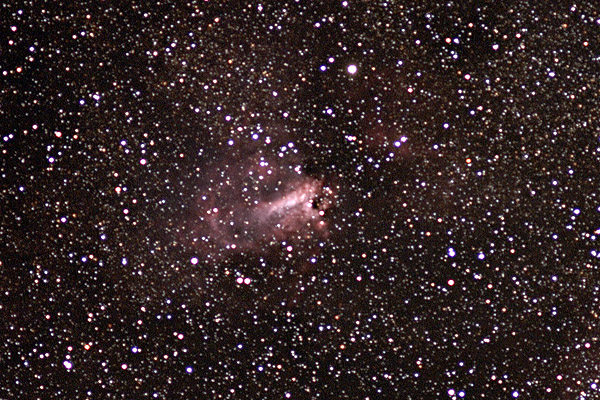
The Omega Nebula in Sagittarius. Stack of five 5-minute exposures, 300-mm lens at f/4, Canon 20Da.
Permanent link to this entry
Fireflies, tangled in a silver braid

"Fireflies, tangled in a silver braid" is how Tennyson described the Pleiades.
You're going to see a lot more pictures of this star cluster and its surrounding
dust clouds as I refine my technique this winter.
Stack of four 5-minute exposures, 300-mm lens at f/5.6, Canon 20Da.
Permanent link to this entry
The North America Nebula
|
| |

|
| |
This is another object that I've photographed repeatedly to compare cameras,
lenses, and filters. Stack of three 5-minute exposures, 300-mm lens at f/5.6, Canon 20Da.
There were going to be more exposures, but I discovered afterward that a tracking problem
had ruined two of them.
Permanent link to this entry
Hidden colors of the Moon

[Note added 2012:]
If you see a copy of this picture somewhere and it's not credited to me,
please tell whoever is distributing it that they are violating copyright law.
I'm flattered that people like this picture, but someone else has been passing off
my work as his or her own.
Any copying of my pictures requires my permission.
Please note that it's illegal to pass along improperly copied material, not
just to create it. Thanks!
Here's something genuinely new, taken with an old telescope — my trusty 1980 Celestron 5 —
just this evening (Oct. 28). The telescope was
direct-coupled to my Canon 40D, and I used the electronic first shutter curtain
to eliminate vibration. You're looking at a picture of the Moon with the color saturation greatly
increased, to show the mineral composition of various parts of the surface.
Blue indicates titanium-rich areas.
Permanent link to this entry


|
2009
October
27-28
|
Williamsburg
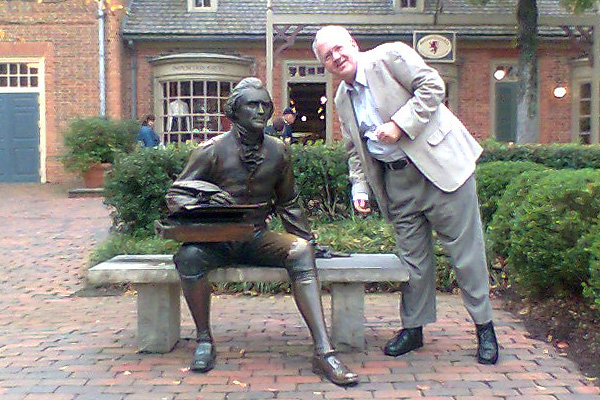
I've just returned from an intensive research-group meeting, at which I had
the pleasure of meeting Mr. Jefferson, and found him looking rather metallic
after all these years. More astrophotos tomorrow.
Permanent link to this entry


|
2009
October
26
|
Triangulum Galaxy (M33)
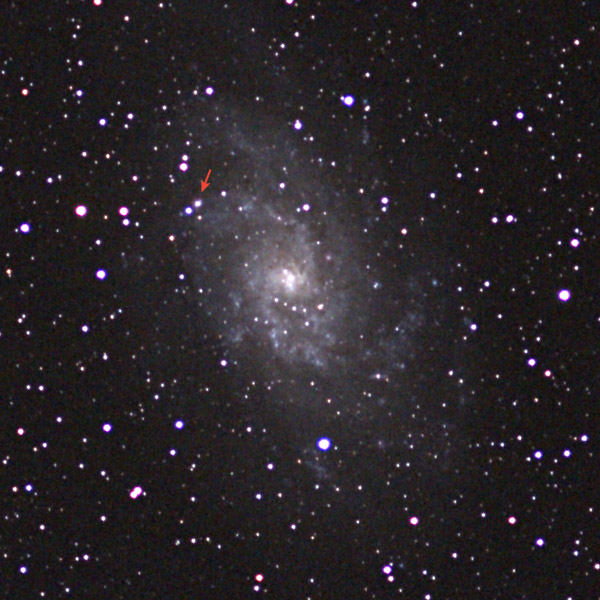
Here's the finished version of the image of which I gave you a preview the other day.
This is still a relatively quick job, a stack of just three 5-minute exposures taken
with a Canon 20Da and a 300-mm lens at f/4.
The arrow points to NGC 604, a gas cloud in the galaxy, and to my surprise, this camera
rendered it gray rather than red, even though the whole point of the 20Da is that it is
extra-sensitive to deep red light.
Compare my
image of M33 with a conventional DSLR
and
Chris
Hetlage's amazing image of the same object with a
somewhat larger telescope and a lot more exposure time.
(I know I photograph the same objects over and over, but what I'm doing is comparing cameras.)
Permanent link to this entry
NGC 7331 and Stefan's Quintet
Looking much deeper into space — but still using a telephoto lens only three
inches in diameter — we see some distant galaxies:
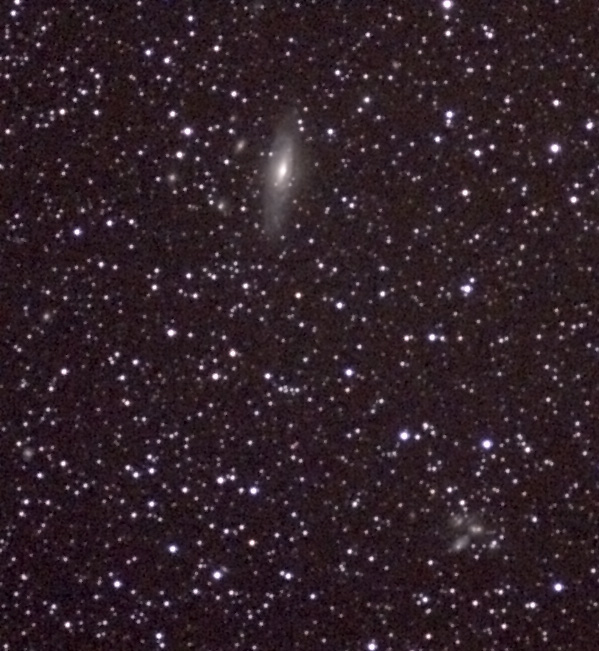
This field is in the constellation Pegasus. The big one is
NGC 7331;
the group at the lower right is
Stefan's Quintet,
over 300 million light-years away
(more than 100 times the distance of M33).
This is a stack of four 5-minute exposures.
I need to come back and photograph the same area with the 8-inch telescope.
Looking in this direction in space, you can see a lot of galaxies.
Look for fuzzy spots — many of them are quite small.
And then consider that each of these galaxies is comparable to the one we live in,
and we don't know how many of them there are.
Permanent link to this entry


|
2009
October
25
|
Cleaning out the inbox
The following is accumulated material I've been meaning to mention for some time...
If your web browser turns into a "virus checker,"
shut it down!
If you're browsing the Web, and your browser suddenly seems to turn
into a virus checker, with files, folders, and warning messages,
shut it down immediately. It's fake.
It's trying to install a virus.
This happened to me just now when I was innocently reading about
20th-century British literature. Apparently there's a malicious
link attached to a picture of Sylvia Plath somewhere out there.
All of a sudden the web browser was displaying a fake virus scan and
asking my permission to remove the viruses
(i.e., actually, permission to install its own virus).
Meanwhile, my real antivirus
software, F-Secure, popped up a timely warning. I shut down the web browser,
let F-Secure run, and it found a virus in one of my temporary Internet files.
Always start your antivirus software from its own menu item, and
don't trust any virus warnings that appear in your web browser.
From Jeff Duntemann come
two related warnings:
(1) Don't let a web site "update your drivers."
Driver updates come only from Windows Update or the hardware manufacturer.
Virus checking is done only by your antivirus software.
Third-party web sites that offer to do these things are likely to be
wanting to install a virus.
(2) If an e-mail from classmates.com says someone is trying to contact you, be skeptical.
There have been accusations that classmates.com is sending out fake e-mail messages
to try to get people to sign up, and Jeff got one from a "classmate" that
he can prove does not exist.
Permanent link to this entry
Speaking tour continues
I'm now 40% of the way through my series
of 5 presentations on 5 different subjects inside of 4 weeks.
The people at Emory have made a nice poster advertising the one I'm doing there:

Click on the image to see it full size. If you happen to be in Atlanta, print it out and put it up somewhere...
NOTE [Oct. 30]: This has been updated because the room has been changed.
(And no, that's not a picture of me.)
Permanent link to this entry
Hyphen
-ation?
A new rule of English punctuation seems to have been released into the world
by Internet Explorer 8; at least, I haven't seen it anywhere else.
The rule is that when a word that already contains a hyphen (such as "class-action")
is broken at the end of a line, the hyphen goes onto the second line, like this:
class
-action
If the hyphen only indicates a line break, and wasn't already there, then it stays
at the end of the first line:
hippo-
potamus
Internet Explorer 8 follows the first rule when displaying web pages.
The second rule is moot because web browsers don't break words that aren't already broken.
But I wonder if the new rule will catch on.
Permanent link to this entry
Economic miscellany
The new culture of thrift
has made
it onto Saturday Night Live.
Watch and chuckle.
[Addendum:] Peter Albrecht tells me that when he watched this one, it was preceded by a
commercial for a Cadillac SUV, which made it even funnier.
Thursday, October 29 will be a big day — that's when we'll get the first measurement
of U.S. GDP during the third quarter (July-September). Maybe it will be time to declare the
recession over. However, there is every reason to expect unemployment to stay abnormally high
for another year. It's becoming increasingly clear that alongside a housing bubble, we
had an employment bubble during which lots of people were hired into jobs that aren't sustainable.
A sampling effect: A well-known financial talk-show host reports that, when people start
following his plan for debt-free living, their income often increases in surprising ways,
helping them pay off their debts even sooner than they planned.
Well... One likely explanation (apart from divine intervention!) is that when people start to
tighten up their finances, they become more aware of opportunities and more willing to utilize them.
Debt-free living builds character.
But another possibility occurred to me: He only hears from people who were successful.
People who started following his plan, and couldn't keep it up, don't call in later to report how
things went. If their income increases, they call in and say so; if it decreases, they don't.
There may well be a random mix of the two, or even (in a recession) a preponderance of decreases
that we're not hearing about!
[Revised.]
Is it unethical to "walk away" from an upside-down mortgage, and simply let the bank foreclose?
(Don't worry; this is not happening to me; this is a theoretical question only!)
It can be more costly than you expect; there will be damage to your credit rating, and hidden costs
for years to come. But is it wrong?
It depends on what you consider yourself to have promised.
This columnist says that
when you signed up, you promised the bank either the payments or ownership of the property.
That was the deal. From his perspective, there is nothing morally wrong about taking the second option.
That may be OK for business credit, where corporations can easily dissolve if they run out of money.
But for personal credit, I think there is also an issue of personal integrity.
It's almost a moot point, though, because if you walk away — and you could have avoided it —
then the damage to your personal credit rating is devastating.
If you could not have avoided it, then it was a maneuver akin to declaring bankruptcy,
with all the consequences.
Finally: Due to a flurry of foreclosures and short sales, the real-estate market is chaotic right now.
The Atlanta paper notes that this
is not a good
time to get anything appraised.
(It's not just the rough market; new rules, designed to ensure unbiased appraisers,
often bring in appraisers who are unfamiliar with the local area.)
Sure enough, Zillow
is again saying my house is priceless, or worthless, or invaluable, or something —
that is, after reporting a remarkable run-up during the spring and summer,
it now refuses to give a value for it at all.
Permanent link to this entry


|
2009
October
24
|
How to make a lumpy random-number generator
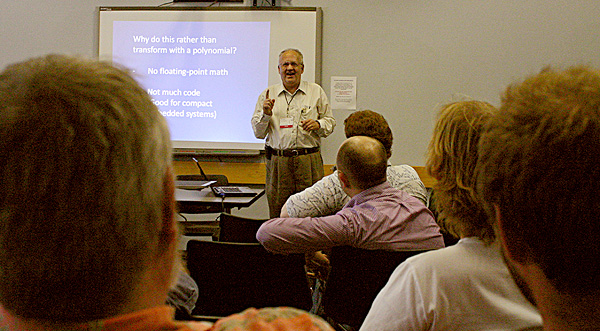
Photo by Ian Ennis
The talk I gave at IWP9 is on Internet TV already (LiveStream).
Click here to
view it as video, or here to merely read the paper.
It's a mathematics paper — not computational linguistics or psycholinguistics. I enjoy working in a place where
basically nothing in computational science of any sort is off limits.
I'm building up quite a backlog of things that ought to be in this Notebook
but won't be written for days to come. Stay tuned...
Permanent link to this entry


|
2009
October
23
|
Too much going on
As I prepare to speak at IWP9 (which is No. 2 of 5
presentations I'm giving in a four-week span), I'm too busy to write much here...
so go and look at the
Nikon Small World Gallery instead.
Permanent link to this entry


|
2009
October
22
|
Preliminary image of M33

This is a single 5-minute exposure of the spiral galaxy M33 with a 300-mm f/4 lens
and a Canon 20Da. A stacked image is coming...
Permanent link to this entry


|
2009
October
21
|
Stay tuned for astronomy...
It's 2 a.m. and Melody and I just got back from a
successful trip to Deerlick
with a Canon 20Da kindly lent by Canon USA.
Pictures soon!
Permanent link to this entry


|
2009
October
20
|
Jupiter

Not the best picture of Jupiter I've ever taken, but as you can see,
the Red Spot is still there. It varies in size and redness from year to
year but has existed at least since
this painting
made by Donato Creti in 1711.
It is not a solid object, but rather a storm, something like a hurricane.
When you have an atmosphere as big as Jupiter's, you can have a 300-year hurricane.
Permanent link to this entry


|
2009
October
19
|
Brief report from Peach State Star Gaze
Melody and I attended just enough of the PSSG to get to the last two talks, which were given,
respectively, by me and by Brother Guy Consolmagno, S.J. It was cold and rainy, a great
disappointment to people who came from far away to enjoy our dark-sky site.
My talk was on astrophotography on a budget. Key idea: Our hobby isn't photographing the sky,
it's photographing the sky easily and affordably. The Hubble Space Telescope can already
take better pictures than we do. We enjoy the challenge of doing good astrophotography on a much
smaller budget. So a further reduction in the budget doesn't destroy our hobby; it just shifts
the focus a little.
My worst pun: "In view of today's weather, I wish the committee had accepted my offer to give a
second talk, on image processing, so that I could discuss the
Drizzle algorithm."
Brother Guy is on the staff of the Vatican Observatory. His talk was about both the work of the
Vatican Observatory and the reason for its existence. Key idea: Appreciating the universe is
one way to honor God; Christianity provides the context for science to emerge, by teaching that
the universe was made by a Creator who also made us, and who made us able to understand much of it.
He also pointed out that most of us have been miseducated. In elementary school, we were taught
that the Church tried to snuff out science, and its mistreatment of Galileo was typical.
Actually, what happened to Galileo was a colossal blunder; the reasons for it are hard to
reconstruct, and the Church has admitted that it was wrong.
(Galileo himself remained a loyal Catholic; the way he saw it, he had had a run-in with
a bunch of bureaucrats, not with the Visible Body of Christ.)
More typically, during the Middle
Ages and Renaissance the Church fostered a huge number of scientists such as Oresme, Nicholas of
Cusa, and, yes, Copernicus. (Copernicus' book was in disfavor for a while some decades after he
published it; that was another blunder, and a clumsy one because meanwhile, Church astronomers
were using it!) The "warfare between science and Christendom" that
we read about is largely a myth from atheistic propaganda in the 1800s.
This was not news to me, but as a Christian, I was delighted to hear him say it. Amateur astronomers
are often solid unbelievers who use astronomy as a substitute for religion. It was presumably a
tough audience, but he got a very good reception.
His worst pun: Describing how the Vatican Observatory
built a new telescope of the Gregory or Gregorian design,
he said, "Nobody was sure it would work, but we took the chance. We took the Gregorian chance."
(Moan...)
Permanent link to this entry


|
2009
October
18
|
Duntemann on economics
Read this for some very apt observations.
Permanent link to this entry


|
2009
October
17
|
Duct-tape programmers?
I'm too busy to write... Instead, go read about
duct-tape programmers
— people who are more interested in making things work
than in following a methodology.
Permanent link to this entry


|
2009
October
16
|
Econ-Observations
There won't be a Social Security cost-of-living increase
because the cost of living hasn't gone up.
Media, stop whining. Why should people get cost-of-living increases
when the cost of living has gone down?
(By the way, the Social Security increases
are indexed to the actual inflation rate;
the Georgia TRS increases are limited to 3% per year and often
need to continue, in a period of less than 3% inflation, to catch up with higher inflation in the recent past.)
I've been listening to Dave Ramsey's financial call-in show, not for the answers,
but for the questions. It's quite a financial comedy (or tragicomedy).
Observations:
-
Theft by parents from grown children is disconcertingly common.
It usually takes the form of identity fraud. I can't always tell, but I
suspect it often involves crossing a social-class boundary —
the adult children are better
educated and the parents imagine that they are immensely rich.
-
One recurrent theme is, "My girlfriend and I aren't ready to be tied down
by marriage... by the way, we have two children together..."
-
Heard recently: "I lent my husband $34k and he's paying me back in monthly installments..."
-
Also heard recently: "I'm a stay-at-home mom and I can't get my husband to take on a second job to pay off my $50k of student loan debt."
(I thought the purpose of a student loan was to help you earn money.)
Distinguished economists argue that
the Fed created the "bubble"
by keeping interest rates too low from 2002 to 2005.
The "Taylor rule" is a formula for adjusting interest rates to control inflation; the actual interest rates
were much lower than the rule called for. Incidentally, what I just referred you to is the blog of Taylor himself.
Permanent link to this entry


|
2009
October
15
|
Paging Miss Athens...
A major Silicon Valley company that should know better has gotten it into its (computer's) head
that someone works here who is named Georgia Athens.
Well, it does give the address a certain symmetry...
Permanent link to this entry


|
2009
October
14
|
Working, not writing
I'm working on lots of things and not writing in the Daily Notebook.
(Except of course the date, the title,
that sentence, and this one, if it is a sentence...)
Permanent link to this entry


|
2009
October
13
|
Fame thrust upon me
My (in)famous presentation on
How to
Write More Clearly, Think More Clearly, and
Learn Complex Material More Easily
is having a sudden burst of fame due to having been referenced
on del.icio.us and, apparently, other web sites.
Now is a good time to remind the eager public that I am available to give talks on
this material, and also that I must safeguard my copyright, so I can't let you republish
my material free of charge on your web site. (You are of course most welcome to link
to it.)
Permanent link to this entry
Speaking engagements
Speaking of giving talks, I'm giving five presentations in the next four weeks.
Some are at conferences that require registration, and one is not open to visitors at all.
Here's a tentative schedule:
Oct. 17 - "Astrophotography on a Budget,"
Peach State Star Gaze,
Deerlick Astronomy Village, Taliaferro County, Georgia.
Oct. 23 - "How to Make a Lumpy Random Number Generator,"
International Workshop on Plan 9,
Athens, Georgia.
Oct. 27 - "The SAE Text Analysis System,"
NSF-sponsored research meeting at College of William and Mary, Williamsburg, Virginia
(not open to visitors).
Nov. 3 - "Linguistics, Schizophrenia, and Computers,"
Emory University, Atlanta.
(Click on that link and scroll down for details.)
Nov. 9 - "Design and Implementation of a Campus Computer Ethics Policy,"
Dept. of Computer Science,
University of Georgia.
Permanent link to this entry


|
2009
October
12
|
Back to the old roads
For 25 years we've lived in Athens, Georgia, on side-streets off Timothy Road
a mile or two southeast of Epps Bridge Parkway. (Not in the same house
quite the whole time.)
And in the 1990s, there were two major changes to the way we habitually travel.
From our house to the University of Georgia, it became more practical to
take "the southerly route" via the southeast end of Timothy Road, due to
the advent of the South Bypass and other improvements. And for trips to
Atlanta, we gleefully started using Highway 316, which is nearly limited-access,
as soon as it opened, instead of old, slow Highway 78.
Well, in recent weeks I've resumed taking "the northerly route" to work,
via Epps Bridge Parkway (formerly Epps Bridge Road). There are way
too many crashes on the southerly route, which is a narrow winding road
that has become congested. (The other day I took the southerly route home out
of old habit, and had to drive through the aftermath of a 5-car pileup.)
Meanwhile, the Parkway makes the northerly route
faster than it used to be.
And the other day, Melody and Sharon came back from Atlanta on Highway 78
and found it surprisingly quick. Highway 316 goes through a fast-growing area
in Gwinnett County and has traffic jams. Meanwhile, old 78 has been upgraded
in various ways and is nearly as close to being a freeway as 316 is, but
without as much congestion.
So the optimal route may be, again, what it was 25 years ago.
Permanent link to this entry


|
2009
October
11
|
Volvo gas tank cap door falls off
Sharon's car is a spry but elderly Volvo S70.
A while back the door for the gas tank cap
(the "fuel door") fell off.
Fortunately this happened at a gas station,
and Sharon picked up the door, which was undamaged.
This evening I fixed it. What broke was the set of four
plastic rivets that hold the door hinge to the body of the car.
The catch (which inserts into a hole when the door closes)
was also broken.
Total of $13 for parts, new, at the Volvo dealer.
The catch is a $2 part and is replaceable with your bare
hands. The hinge accounts for the rest of the cost.
What you do is hold the plastic rivets in place and drive
the central pin home with a hammer and a 1/4-inch pin punch.
Actually, I had to spend another $13 on a set of pin punches
because Lowe's didn't have large ones singly. But the
repair was very quick and neat.
If this happens to you, just don't lose that door!
I think there's a reason Volvo made those rivets so flimsy.
If your fuel door comes open and another car snags it, the
rivets are supposed to come loose before substantial damage
is done to either car. Better to lose a fuel door than to have
a whole quarter-panel bent.
Permanent link to this entry


|
2009
October
9-10
|
Two techno-notes
Guess what?
Stepper motors
can be used as generators — the
circuit
is a lot like a car alternator.
Stepper motors are, after all, 2- or 3-phase AC motors, except that
we normally run them on very strange AC, generated one
pulse at a time by a computer.
Meanwhile, Jeff Duntemann points out that
you can get rather powerful
computers free, as cast-offs. Do a clean reinstallation of Windows XP and
the performance is quite good. A lot of people throw away their computers when
all that's really needed is to remove the viruses and spyware.
Permanent link to this entry


|
2009
October
8
|
Not the same economy
Dealing with some things that have been in the inbox for a while,
let me quickly note a set of news articles pointing out
permanent (?) changes in how Americans handle money.
Read about it on NewsBlaze,
AP, and
Reuters
One change is that we are never going to buy as many automobiles or McMansions as we
were trying to build and sell last year.
Another has to do with the money supply. No matter how much money the Fed injects into
the economy,
people just
use it to pay down debts or build savings, not to
increase consumption.
This is partly because banks are no longer lending to wild spenders,
but there has also been a cultural change.
As Dave Ramsey says, "The paid-off home mortgage has replaced the BMW as the status symbol
of choice." To which I retort, it's still a status symbol and is no more morally
defensible than any other. I'm not going to deny my children a proper education in order
to have a status symbol.
That, in turn has led to intermittent deflation and
a debate
(see also this)
about what's coming next.
I continue to feel that in the long run, there has to be inflation, because eventually, all this
money will start circulating, and we might get a rather sudden transition from deflation to
inflation.
If inflation comes, it's good to have a low fixed-rate mortgage, and to invest in real estate and
the stock market. Those are good things to do anyway, and I'm doing them.
(Clarifying a point about real estate: The bursting of the bubble is in the past. Despite the bubble,
it has always
been, generally, a good idea to invest in real estate. It has been a bad idea to bet that a particular
piece of real estate will certainly go up sharply right away — that's what the
bubble was all about.)
People are good at preparing for the past. For decades to come, people will manage their
affairs to prepare for the Panic of 2008.
Permanent link to this entry


|
2009
October
7
|
Very short note
I'm still updating the Covington Innovations web site rather than writing here.
Attentive readers will notice a new disclaimer at the bottom
of the page.
Permanent link to this entry


|
2009
October
6
(Extra)
|
Short notes
My lab didn't get vandalized over the weekend, but
the School of Art did,
costing a graduate student the products of many weeks' work.
Some other buildings were also broken into. This is evidently the work of
individual burglars rather than "football crowds," but the overcrowding
surely made it easier for the criminals to get away with it.
Good keyboard: Unicomp bought
the patent rights to the original IBM PC keyboard, with its firm "click" action, and
now you can get that type of keyboard with a USB interface. I got one at work and am
enjoying it. I type faster and more accurately than with a newer-style soft-touch keyboard.
(But not quieter. People can hear me typing...)
Finally, someone
thinks what I thought: we haven't been having a drought so much as a lack of infrastructure.
Georgia cities chose to build water systems that are sufficient only when it is relatively rainy...
Permanent link to this entry


|
2009
October
6
|
Dell laptop jumping-cursor problem
Frequently, when I'm typing on this Dell D830 laptop, the cursor suddenly jumps
to a different line, usually higher, sometimes lower.
Fixes that have been suggested, and which I'm trying one by one, are:
(1) Clean trash off the touchpad. (There was a good bit of it.)
(2) In Control Panel, Mouse, Dell Touchpad Settings, turn off tap-to-click, or make
the touchpad less sensitive.
(3) Roll back or change the touchpad driver.
So far, (1) made some progress but may not
have cured the problem. I'm pretty sure the problem is from phantom
touchpad taps; whether (2) or (3) will be required, I don't know.
Update: Still working on it... flexure of the plastic case may be the problem.
Permanent link to this entry


|
2009
October
5
|
Web work
Instead of writing here, I spent some time implementing and uploading
Melody's latest improvements to the design of
our web site.
The basic design hasn't changed, but the implementation has been adapted to
behave better on wide screens. The content will get substantial updates in the
coming weeks. Not all pages have received the update yet.
Happy birthday, Melody!
Permanent link to this entry


|
2009
October
4
|
Astro-economics
On October 17, at 1:30 p.m., there's going to be a lecture that ties together astronomy
and economics. And, oddly enough, it's not going to be given by my good
friend Doug Downing, the astronomer-economist.
It's going to be given by me.
The venue is the Peach State Star Gaze
(at the Deerlick Astronomy Village)
and the title is something like, "Amateur Astronomy and Astrophotography on a Budget —
Stargazing in a Time of Recession."
I'm going to go rather deep into how we make decisions about hobby
equipment and activities, how to enjoy amateur astronomy with limited funds,
what kinds of equipment do and do not retain their value, and how the recession
is affecting us.
Come one, come all! And if you don't want to hear me, come listen to
Guy Consolmagno,
who is speaking the same day.
I don't know what he'll be speaking about, but he's the author of a
very interesting book.
Permanent link to this entry


|
2009
October
3
|
Another football weekend
[Revised again.]
As I write this, it's Friday evening and my 36 hours of exile have begun.
I refer to the 36-hour period during which faculty and students are required
to remove their cars from the campus in order to accommodate football fans.
I can go to my office if I like, but I can't park my car. Students who live
on campus have to move their cars to a distant parking lot.
Nearly shutting down
the University for 36 hours several times during fall semester must
have huge hidden costs.
The students don't all go to the game — in fact, the ones who order
tickets have only about a 50% chance of actually getting them.
Anyhow, a football game doesn't last 36 hours, and it's unreasonable to
assume everybody wants to stop everything for The Game.
We have scientists running experiments,
artists with paint or cement drying, and students of all kinds with
studying to do.
Meanwhile, vandalism is a persistent problem. This time, my lab won't be hit —
but only because the building will be locked and guarded, and
my own students will have trouble getting in.
The School of Art ceramics studios, close to the stadium and partly outdoors,
reportedly suffer vandalism every time there is a football game.
And we've just [9:45 Saturday] received a warning about armed robbers.
When these students are alumni,
are they going to remember the team and the games,
or just the fact that on game weekends,
they were neither safe nor entirely welcome on their own campus?
Maybe this is how the football program will downsize itself in the long run.
[Addendum:] What do I recommend?
UGA should do what other universities do, and build a stadium an appreciable
distance from the campus. The problem is that our stadium is in the exact
center of the campus, and you just can't bring in 100,000 guests, plus their cars,
to a space already occupied by 30,000 people,
without overwhelming all available resources. Traditionally, stadiums are a mile or
so from the central campus (e.g., at Yale or Stanford),
although in this case, it might be better to put it on Highway 316
in Oconee County, about six miles out, for easy accessiblity by car from Atlanta.
The University already has other outlying athletic facilities, such as
its equestrian center.
Permanent link to this entry


|
2009
October
2
|
Electronic first shutter curtain on Canon DSLRs
What's better than mirror lock?
 
One of the least-known features of the Canon EOS 40D and many of its relatives
(including, as I understand it, the XSi) is the electronic first shutter curtain.
Normally, a DSLR uses a focal-plane shutter just like a film SLR.
One curtain moves aside to uncover the sensor, and the second curtain
follows it to end the exposure. If the exposure is short (like 1/1000 second),
the second curtain follows the first one so closely that the entire sensor is
never exposed at once — instead, the shutter forms a fast-moving slot.
Canon DSLRs have the ability to begin the exposure electronically with zero vibration.
Above, you see how much difference it makes. Both pictures are 1/100-second exposures
taken through a Celestron 5
on a solid pier. The blurry one used mirror lockup in the standard way; the sharp one used
the electronic first shutter curtain.
In fact, as I understand it,
the "electronic first shutter curtain" is a virtual moving edge just like the real
shutter curtain, so you can use it even with short exposures.
Columns of the sensor are turned on one by one just as if the real curtain were
exposing them.
Because a CMOS sensor can't turn off as quickly as it turns on, the real shutter curtain
is used to end the exposure. But it introduces little vibration because, of course, the
exposure is ending, and it only takes something like 1/10,000 second to make its journey
from one side to the other.
Why haven't you heard of this? Because Canon calls it Silent Shooting and advertises
it only for quietness.
Here's what to do. Enable Live View Shooting and choose Silent Shoot Mode 2 (on the 40D;
others are probably similar). (See your instruction manual for particulars.)
Now here's how to use it:
- Press Set to initiate Live View. The shutter opens and you get a continuous image from
the sensor. Focus, using the magnifier as you wish.
- Press the button to take the picture. In my situation, I had the 10-second delay set so
that vibration from my touching the camera would die away; I recommend this.
After the delay, if any, the exposure begins electronically. When it ends, the shutter
closes.
- All this time, you can hold down the button if you wish, although normally you will
have only pressed it momentarily. If you're still holding the button down, the shutter won't reopen
until you release it. This is for maximum quietness, when photographing wildlife.
- Press Set again to save battery power when you're finished using this mode.
Enjoy!
Permanent link to this entry


|
2009
October
1
|
A major change in Microsoft Windows
(No, I don't mean Windows 7)
Happy new month!
Those of us who use Microsoft Windows are living in a different world today
than a few days ago. And it doesn't matter what version of Windows.
What's new is that Microsoft is taking responsibility for virus protection by distributing
a free antivirus program
which is getting excellent reviews. I have it on one of my computers already
and will report on its performance.
What's in it for Microsoft? Well, viruses are the main disadvantage of Windows right now.
Also, the Microsoft antivirus program also checks whether your copy of Windows is genuine.
(Pirate copies have apparently been sold in Asia by the millions.)
People are going to whine that the program says it's going to report some characteristics
of your computer to Microsoft via the Internet. Folks, all antivirus programs do things
like that if you let them — that's how they keep track of what's going around.
The only bad thing I've noticed about it so far is a clumsily written EULA
(end-user license agreement). It is apparently boilerplate language from other
products; it forbids us to publish benchmark results (which is a holdover from
early .NET Framework) and acknowledges MPEG-LA (as if it were going to display movies).
And it only mentions use in homes and home-based businesses. Surely they didn't mean
to exclude commercial users? [Yes, in fact they did; a different product for business
users is being developed. I'm not sure of the status of educational institutions.]
Permanent link to this entry


|
|
|
This is a private web page,
not hosted or sponsored by the University of Georgia.
Copyright 2009 Michael A. Covington.
Caching by search engines is permitted.
To go to the latest entry every day, bookmark
http://www.covingtoninnovations.com/michael/blog/Default.asp
and if you get the previous month, tell your browser to refresh.
Entries are most often uploaded around 0000 UT on the date given, which is the previous
evening in the United States. When I'm busy, entries are generally shorter and are
uploaded as much as a whole day in advance.
Minor corrections are often uploaded the following day. If you see a minor error,
please look again a day later to see if it has been corrected.
In compliance with U.S. FTC guidelines,
I am glad to point out that unless explicitly
indicated, I do not receive payments, free merchandise, or other remuneration
for reviewing products on this web site. I have a Canon EOS 20Da camera and a Tektronix
TDS 210A oscilloscope on long-term loan from their manufacturers. Other reviewed
products are usually things I purchased for my own use, or occasionally items
lent to me briefly by manufacturers.
|
|
















